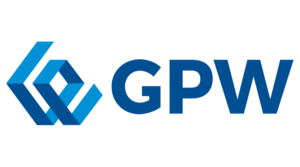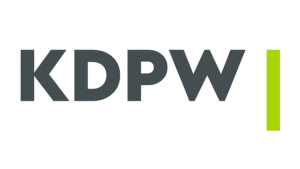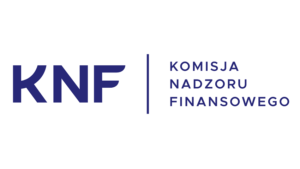Investor FAQ
We listen to your questions, enter into dialogue and try to meet your needs. For this reason, we have prepared some Frequently Asked Questions with exhaustive answers from our Board, management and specialists from scientific and administration teams.
SDS Optic S.A. carries out highly technologically advanced projects, effectively combining optoelectronics (photonics) with molecular biology, immunochemistry and medical engineering. We are glad that despite the complex technologies, processes and competencies, you are keen on our Company and the inPROBE fibre optic microprobe.
As a company listed on the NewConnect Alternative Trading System (ATS) run by the Warsaw Stock Exchange, we have chosen maximally transparent communication with our shareholders, supporters and those interested in our operations.
frequently asked questions
Investor's FAQ
The decision is yours. It is absolutely worth becoming familiar with our business activities. The inPROBE fibre optic microprobe for diagnosing HER2-positive biomarkers is innovative and unique on a global scale. We are a modern company, and our interdisciplinary team of scientists and specialists every day proves that the inPROBE technology has a future ahead.
On our website and in social media channels we focus on transparent communication to allow each visitor to form their own opinion about us.
Follow our social media to stay up to date with the current events:
1) Twitter: www.twitter.com/SDS_Optic (@SDS_Optic)
2) Linkedin: www.linkedin.com/company/sds-optic/ (@SDS Optic Inc.)
3) Facebook: www.facebook.com/sdsoptic/ (@sdsoptic)
4) YouTube SDS Optic: https://www.youtube.com/@sdsoptic
5) Twitter inPROBE: https://twitter.com/inPROBE_ (@OncoMicroprobe)
6) Facebook inPROBE: https://www.facebook.com/inprobemedtech (@inprobemedtech)
The pandemic, rising inflation and events beyond our eastern border are unquestionably leaving their mark on the economic situation and share prices worldwide.
In Poland, the biotechnological sector is constantly on the rise, closely combining innovative fields of science with business. Med-Tech and Bio-Tech projects require patience, but offer attractive profits in the long run. Our observations show that Polish investors are aware of this fact and are more willing to invest in biotechnological companies.
We do not comment on the movements in share prices of SDS Optic S.A. Regardless of the stock market situation, our priority is to implement our strategy and achieve new milestones in order to ultimately deliver a validated and safe product. In this way, we fulfil the promises given to patients, doctors and shareholders.
To this day, we had invested over PLN 54 M and raised almost PLN 60 M. These funds come from private investors (e.g. seed funding and venture capital) and public subsidies (e.g. the highest subsidy in the history of Polish companies from the SME sector of nearly EUR 4 million from the European Commission under the Horizon 2020 program).
Project development is also possible thanks to our shareholders. In June 2021, as part of the D series share issue, at the pre-IPO stage we had received PLN 11 M from private investors, e.g. renowned global investment funds. At the beginning of 2023 we conduct another public offering round and
The last issue was in February 2023.
We do not exclude new issues as this is a natural stage in the development of all biotechnological companies. We already talked about this openly at our meetings and presentations at the pre-IPO round. Now we have secured funds for several months of business operations. We also have new tranches from the EU subsidies, which gives the prism of autonomic operations for a long time and ensures the achievement of our milestones.
The exact date of the next issue has not been arranged yet. We are now focusing primarily on the consistent achievement of our milestones and on building the Company value. Any changes in this respect will be announced in our current reports.
inPROBE is currently being developed for detecting HER2-positive biomarkers in breast cancer. The project is at the stage of clinical studies, which will take several months. At the same time, we are implementing the inPROBE commercialisation process.
The completion of R&D works is scheduled for the end of 2023/beginning of 2024, and consists of clinical studies and a comprehensive process of ISO 13485 certification and EU-MDR compliance for the European Union markets. The value of the remaining part of the investment is about PLN 5 million, and we have already secured funds for this.
The development of biotechnological projects and advanced technologies combines a plethora of components, stages and risks. The factors influencing the pace of actions are the operations of our multidisciplinary team, external institutions that supervise and regulate the process of the clinical studies, and target users of our solution (doctors and scientists).
Our priority is to deliver a safe, effective and validated product, adjusted to users’ needs. For this reason, at each stage of the project we consider all feedback and adjust our solutions on a current basis.
One example are the clinical studies interrupted by the coronavirus pandemic in 2020, when large clinical hospitals were transformed into dedicated hospitals, which totally suspended our works.
In addition, in May 2021, we adjusted the entire medical documentation to the updated Regulation 2017/745 of the European Parliament and of the Council of 5 April 2017 on medical devices, amending Directive 2001/83/EC, Regulation (EC) No 178/2002 and Regulation (EC) No 1223/2009 and repealing Council Directives 90/385/EEC and 93/42/EEC (Mandatory Disclosure Rules). This delays the commencement of the studies, yet guarantees that the commercialised technology meets the applicable requirements of the certification and validation, which significantly increases its value in the commercialisation process.
After easing the restrictions, our team was ready for action as early as the beginning of 2022. In the course of the initial pre-clinical training sessions (January-February 2022) we received valuable medical feedback, associated with additional improvements to the study. We decided to implement part of these in the manual section of the procedure, which took several additional weeks. In order to fully comply with all the regulatory requirements, we decided to submit an update form to the Office for Registration of Medicinal Products, Medical Devices and Biocides (URPL). At the end of June 2022, we received final approvals for the implementation of significant changes to our clinical study. Ultimately, the product quality, safety and functionality are of utmost importance. This step improves the technology attractiveness in the medical environment, which will translate into its value in the commercialisation process.
Thanks to the flexible form of the project development, which allows for responding to changes, we will ultimately deliver a significantly higher value, important for end users and our Shareholders.
Our business model is based on two pillars:
- our own production of the microprobe and sale of devices as part of our own semi-industrial infrastructure of the production of photonic biosensors;
- sale/licencing of selected parts of the technology (acc. to the area of interest).
We have already begun the implementation of the inPROBE commercialisation process.
We are currently developing our own production line with an annual production capacity of up to 50 thousand microprobes. The installation of the machines and the start-up of advanced production devices in dedicated rooms with controlled environment parameters (clean rooms) will have been completed by the end of 2022.
At the end of 2022/beginning of 2023, we will start development of the automated production processes. Then, we will go on to the process of certification and validation of these, which ultimately will make it easier for our potential partners to talk to us about commercialisation, and will facilitate future scaling of the technology.
The microprobe should be available immediately after receiving the certificate (following completion of the clinical studies). To the best of our current knowledge and according to our team’s estimates, the approximate date of the product launch is the end of 2023/beginning of 2024, which can change in case of unforeseen circumstances.
We are also fine-tuning technical issues connected with the second pillar of our business model, i.e. winning an M&A partner, opening a facility in the USA, and entering into relations with licensed partners within the scope of inPROBE production and international sale.
inPROBE consists of a detector and one-single probe in the form of a fibre optic biosensor. The apparatus serves for in vivo (in the patient body) measurement of concentrations of specific molecules, markers or bioactive elements, avoiding tissue collection and preparation. The test lasts several minutes and provides objective exact numeral real-time results.
This global revolution is comparable to the invention of magnetic resonance imaging.
The principles of operation of the technology are based on the patented method of optic fibre airtight sealing, which allows combining photonics with advanced molecular biology, medical engineering and immunochemistry. In this way, we are able to place a histopathological laboratory on the front face of the optical fibre.
The inPROBE technology is a breakthrough in the market of traditional in vitro diagnostics (in the laboratory). The results are rapid (within minutes). Numerical data is objective, accurate and free from “human errors”. inPROBE can supplement a traditional biopsy, giving a more exact and earlier diagnosis, as well as indicating effective treatment.
Currently, we are applying the technology in diagnosing HER2 in breast cancer, but it shows a significantly higher potential that we are going to use.
inPROBE is a scalable technological platform. In the future, it can serve for detecting other cancer biomarkers (e.g. in prostate, stomach, large intestine, lung and brain cancer), infectious diseases (e.g. coronavirus), eye diseases (e.g. wet age-related macular degeneration) and fungal diseases (e.g. sepsis – a contemporary challenge for medicine).
The inPROBE technology has a great potential in monitoring the effectiveness of medication delivery into a target place in the body, as well as in testing the efficacy of new medications and introducing these to the market.
In the future, inPROBE can deliver essential information on the distribution of medications in tissues. In this way, thoroughly examined medications can be developed and launched in a significantly more effective manner.
We are fine-tuning and implementing the production processes and internal management systems. By the end of 2022, we plan to introduce most of the certification processes and procedures, with those connected with ISO (e.g. ISO 13485). At the end of 2022/beginning of 2023, we are going to commence a test and audit by an independent external entity to evaluate the level of implementation of the necessary standards and requirements. The completion of the audit is scheduled for the second quarter of 2023.
In compliance with EU 201775 MDR, our fibre optic inPROBE microprobe has been classified as a medical device consisting of a sterile probe, and an active medical device with dedicated software.
In view of the new Regulation (EU-MDR) of May 2021, prior to the clinical studies, all necessary tests and studies confirming the safety of use of the medical device for the staff and patients were carried out.
After completing and summarising the clinical studies in 2023, the Company will assess the compliance with EU 2017/275 MDR. The audit will be carried out in cooperation with an authorised Notified Authority. The EU-MDR certificate allows CE marking on inPROBE, submitting the device and obtaining the permit for a launch from the Office for Registration of Medicinal Products, Medical Devices and Biocidal Products in Warsaw.
In order to obtain a certificate of compliance from the EU-MDR, a confirmation that the company has a well-functioning Quality Assurance System is required. SDS Optic S.A. is currently implementing procedures defined in the ISO EN 13485 standard dedicated for medical device manufacturers. This confirms that the manufacturer is able to deliver medical devices and related services in compliance with legal requirements, guaranteeing the declared quality and meeting customer expectations. The Company has defined the key and auxiliary corporate processes with essential system documentation.
We are conducting activities aimed at meeting the regulation of the US Food and Drug Association (FDA) under the “Pre-Submission” procedure and with support from our consultants in the United States.
SDS Optic S.A. has a defined policy for scientific publications that is inextricably linked to the Company’s industrial property rights and data privacy policy.
Below is a list of selected publications and patent rights:
The Company plans new scientific publications, coinciding with the inPROBE technology launch and following the implemented intellectual property management strategy (IP Strategy) defining the selected key components of the technology that constitute the exclusive know-how of the Company and are not subject to patent application restrictions. In our opinion, this approach increases the attractiveness of the commercialisation process for potential corporate partners.
inPROBE has potential in a variety of areas, e.g. in testing the efficacy of new medications and targeted therapies. Contemporary techniques are not able to quickly check whether a drug candidate reaches the intended site (e.g. tumour area). inPROBE quickly and precisely shows whether and at what concentration a drug candidate reaches the candidate site.
Our ambition is to list inPROBE with the FDA (in the category of companion diagnostics). The list contains tests assigned to specific cancers and anti-cancer therapies commercialised by pharmaceutical companies (mostly from the “Big Pharma” group).
What the biotechnological sector can find attractive is the use of technologies monitoring patients throughout the entire treatment process, with simultaneous access to data about concentrations of active molecules of specific medications and of targeted cancer biomarkers, all in real time and avoiding biopsies (which must not be too frequent).
inPROBE shows potential in measurement of concentrations of active molecules of drug candidates and medications already approved for marketing.
Medication delivery monitoring is a wide area of studies and has the attention of the entire Big Pharma market. inPROBE stands out among other techniques as it does not require any markers, additional compounds often used during medication delivery monitoring, or expensive and complex imaging technologies (e.g. MRI, CT), which are increasingly used for monitoring the effectiveness of anti-cancer therapies.
SDS Optic S.A. monitors the market on a current basis and regularly talks to medical units, scientists, doctors, patients and business representatives in the biotechnology and medical technology sectors. We develop technologies in the service of people, responding to the specific needs and expectations of recipients.
Key inPROBE benefits
For hospitals, clinics, laboratories and companies:
– Reduction in diagnostic costs by a minimum of 50% (from ca. EUR 600 to ca. EUR 300)
– No necessity to buy a lot of expensive devices (inPROBE is a one-off cost of ca. EUR 25 thousand)
– Avoiding legal consequences with regard to false diagnostic results (often millions of USD/EUR of compensations)
For doctors:
– Exact and objective numerical results (diagnostics not based on an image)
– Reduction in false positive/negative diagnostic results
– Real-time results (15-20 minutes)
– An easy to conduct method, manually similar to biopsy
For patients:
– Less painful examination (without biopsy)
– Less stress thanks to immediate results and therapy recommendation
– Higher comfort of life throughout the therapeutic process
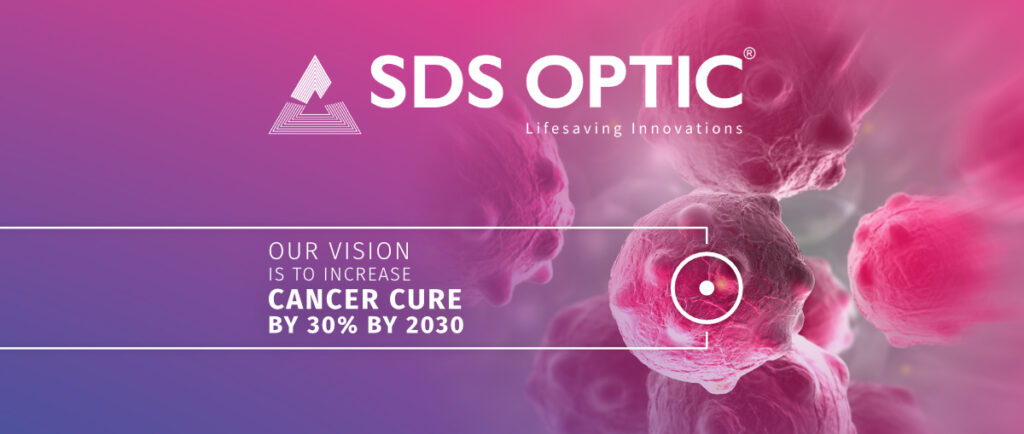
On 4 February 2017 (World Cancer Day), the World Health Organisation (WHO) published a new list of recommended medical procedures and services necessary at an early stage of disease in order to increase the chance of a cancer cure.
The main conclusion was the necessity for the global extensive development of early cancer diagnostics, which saves lives and averts treatment costs.
Sustainable Development Goals (SDG) have been defined to motivate international governments to undertake the aforementioned operations. One such point concerns a one-third reduction in premature mortality from cancers by 2030.
In 2021, a similar goal was included in the European Commission’s Horizon Europe Program against cancer: “the goal of improving the lives of more than 3 million people by 2030, through prevention, cure and for those affected by cancer including their families, to live longer and better”.
SDS Optic S.A. strongly identifies with this mission, which is why we create and develop technologies for diagnosing cancer, infectious and fungal diseases. The vision of “the increase in the survival rates for cancer to 30% by 2030” has become an integral part of our Company’s DNA, connecting and motivating our team.
The basis of our vision: the increase in the survival rates for cancer to 30% by 2030
Source: https://www.who.int/news/item/03-02-2017-early-cancer-diagnosis-saves-lives-cuts-treatment-costs
The European Commission mission is coherent with our vision
Source: https://ec.europa.eu/info/sites/default/files/research_and_innovation/funding/documents/cancer_implementation_plan_for_publication_final_v2.pdf
Biopsy (tissue collection) will be necessary to determine the stage of cancer for a long time. inPROBE will measure the level of a specific cancer marker or another important substance. Our goal is not to replace biopsy, but to supplement it and add it to the current diagnostic path.
After a quick diagnosis of a specific marker and its concentration, it will be able to implement an effective targeted treatment. In situations where time is essential for recovery, it is extremely important that a doctor can immediately refer the patient to an effective targeted treatment.
We also wish to support histopathological laboratories which take care to make additional objective verification of diagnostic results, and look for new methods and techniques.
The inPROBE micrometric fibre optic probe is a unique technology, combining advanced photonics with molecular biology and medical engineering. There is no other similar commercial solution that allows determining the presence and concentration of a specific substance (e.g. cancer biomarker) in the patient body in real time.
Tests measuring the concentrations of cancer markers already exist, but they diagnose only circulating tumour cells (CTCs) and circulating tumour DNA. These solutions are not as reliable as inPROBE technology which measures the concentration of a substance in close vicinity of the tumour.
At an early stage, liquid biopsies are useful for screening tests in patients suspected of cancer, but is not able to determine the location of a tumour and how it is developing. Liquid biopsies are very expensive (from a few to several thousand zloty) and not reimbursed in the majority of countries. A larger number of diagnosed patients can be referred to the next more advanced diagnostic stage, where inPROBE will help in determining the type of the cancer and necessary treatment.
The main trading floor is a perfect place for innovative ventures such as inPROBE. We believe in a natural development of the Company, which is why we decided on the ASO NewConnect market in the first place. We wish to appropriately and gradually prepare all organisational structures for effective and coherent operations in the stock exchange. This time will help us to develop our best Corporate Governance practices and internal organisational processes, which is of fundamental importance when entering the main trading floor.
We are also considering dual-listing in a foreign stock exchange to increase our range and give foreign investors access to investments in SDS Optic S.A. shares.
We are focusing on breast cancers as they constitute the largest number of cases annually. In 2020, the International Agency for Research of Cancer recorded about 2.3 million new cases of breast cancer globally, and about 700 thousand deaths from this disease.
HER2-positive breast cancer is very aggressive and diagnosed in about 20% of cases. At the same time, if diagnosed early, this type of cancer responds well to targeted therapies (adjusted to the cancer sub-type), which often leads to a full recovery.
We believe that faultless real-time diagnostics will enable doctors to quickly respond and choose proper targeted therapies. Effective commencement of appropriate treatment can save lives and the health of a significantly larger number of patients worldwide.
To sum up, HER2 was chosen because an effective targeted medication has been developed for this type of cancer, and its efficacy strictly depends on administering it as early as possible.
Data on breast cancer
Source: https://gco.iarc.fr/today/data/factsheets/cancers/20-Breast-fact-sheet.pdf
Source: https://www.breastcancer.org/pathology-report/her2-status
Part 1 (safety)
All the procedures required for the first part of inPROBE clinical studies are ready. The study comprises 18 patients with breast cancer. After the approval of changes in manual operations during the procedure, the first patient under anaesthesia will undergo a test with inPROBE. At this stage, the safety of this technology in people is confirmed. This stage is estimated to take 3-5 months, but it depends on the doctors and procedure dates of the selected patients.
Part 2 – safety and measurement accuracy
After the completion of the first part and the thorough analysis of the results and clinical observations, the second stage begins. It comprises 196 patients and evaluates the measurement accuracy and essential calibration settings of the device. Similar to the first phase, this stage depends on the schedule of tests of the selected patients, and doctors. The estimated duration is about 6-8 months.
The clinical studies are supervised by a professional CRO.
Naturally, the officially certified medical device will appear in Poland in the first place, for diagnosing breast cancer for HER2 markers. The target company FiBioMed has already been appointed to work on the technology for diagnosing infectious diseases (e.g. coronavirus). We are also holding talks with representatives of BigPharma regarding the potential future use of inPROBE for drug delivery monitoring, which will be of great value in supervising targeted therapies in cancer treatment.
We wish to implement inPROBE into the markets of the European Union, the United States and Asia. We are doing our best to make our device compliant with all the requirements of Polish, EU and FDA regulations.
Comparison of the prices of breast cancer diagnostics with the inPROBE technology:
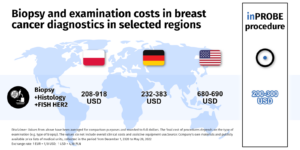
We are striving for full transparency in our operations, respecting our recipients and the requirements connected with our presence on NewConnect. You can find out more about SDS Optic S.A. on our website: www.sdsoptic.pl
Investor Relations
Communication with our shareholders, investors and those interested in our presence on the stock exchange (e.g. essential information and the possibility to sign up for the special Investment Newsletter) is available on the website: https://sdsoptic.pl/relacje-inwestorskie/.
SDS Optic S.A. in social media
We are active in social media! Follow our profiles and posts on current information about the Company and its technology:
7) YouTube SDS Optic S.A.:
inPROBE fibre optic microprobe
If you wish to find out more about our technology, visit our website dedicated to the fibre optic microprobe for in vivo diagnostics within HER2-positive breast cancers in real time: www.inprobe.com
Do you have any other questions?
Email us at IR@sdsoptic.com
Where can I find out more about SDS Optic S.A.?
We are striving for full transparency in our operations, respecting our recipients and the requirements connected with our presence on NewConnect. You can find out more about SDS Optic S.A. on our website: www.sdsoptic.com
Investor Relations
Communication with our shareholders, investors and those interested in our presence on the stock exchange (e.g. essential information and the possibility to sign up for the special Investment Newsletter) is available on the main IR webpage.
inPROBE optic fiber microprobe
If you want to find out more about the SDS Optic’s technology, see the website dedicated to the fiber optic microprobe for in vivo real-time diagnostics in the area of HER2 positive breast cancer: www.inprobe.com
Any other questions?
Email us at IR@sdsoptic.com

